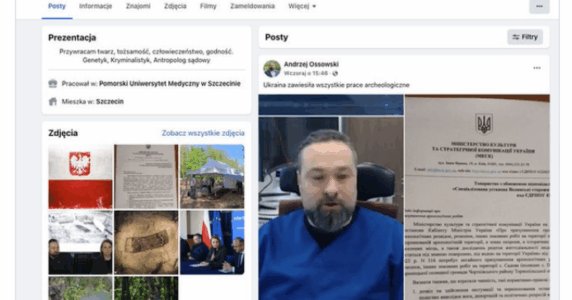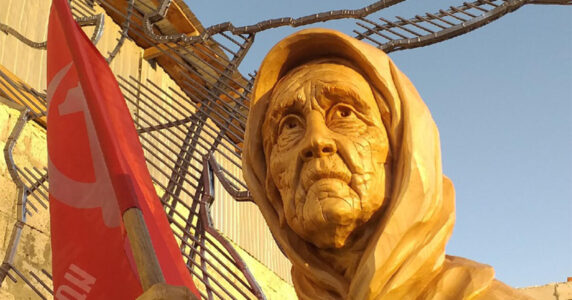Navigation and useful materials
Putin’s address on the occasion of the diplomatic recognition of pseudo-republics in the Russia-occupied territories of eastern Ukraine has been heavily leaning on allegedly historical reasoning. This is not the first time Putin has resorted to this rhetoric. Since 2014, he has been actively promoting his ideas about the past, teaching historians and writing articles. For Putin, the past, or rather, his own distorted view of the past, is a source of legitimacy not only in Russia but also internationally.
It seems like Putin is the president not of the Russian Federation but of a fictional country he invented, “historical Russia.” He cares about the territorial integrity of “historical Russia,” cares about the state of its economy, as well as the morals of its inhabitants. It is from this position that Putin proves his attitude to Ukraine — as a rebellious province that is trying to escape, to leave his imaginary country.
Of course, romantic notions of the country’s own past still play a significant role in shaping national identity. But this can be a topic of exclusively cultural and educational agenda — school textbooks on history, patriotic education, works of art. Each country has its own historical narrative, which is natural, despite the fundamental differences between the historical narratives of neighbouring countries. As in the case of Russia and Ukraine.
However, in the civilized world, these romantic notions cannot serve as guidelines in international relations. The world is not governed by anyone’s subjective notions of “historical rights” but by international law, with universally acceptable principles.
Hitler, too, envisioned himself as a German leader, and Mussolini as the emperor of Rome. Nowadays, citing historical reasoning in relations with neighbours is unacceptable.
For example, clear boundaries are possible only between legitimate internationally recognized states. Clear imaginary borders are impossible in principle between imaginary countries such as “historical Russia” or “historical Germany.” The Earth would just not have enough space to accommodate all these imaginary countries without mutual territorial claims.
The world has paid a heavy price for realizing these principles. The bloody twentieth century has demonstrated the consequences of the fascination with historical romanticism in international relations. Hitler, too, envisioned himself as a German leader, and Mussolini as the emperor of Rome. Nowadays, citing historical reasoning in relations with neighbours is unacceptable.
Once again, Putin declares Ukrainians to be the same Russians, but sort of stray sheep lost from the herd. He calls those Ukrainians who disagree with his views on the past nationalists and neo-Nazis. Thus, in order to bring reality in line with Putin’s world view, Russia needs to get rid of these inconvenient Ukrainians at all costs.
Putin’s rhetoric, which demonizes and dehumanizes Ukrainian citizens who are patriots of their country, points to a way to eliminate them. And it doesn’t matter any more that there are millions of those Ukrainians who do not fit Putin’s view of the world. We have already been through all this in the Soviet Union, when society was formed according to Bolshevik patterns, and entire classes and social strata were subject to destruction.
In international relations, Ukraine consistently relies on the principles and norms of international law, which contain everything necessary to justify the territorial integrity and sovereignty of our state, its representation on equal terms in the community of nations. We need nothing more.
What’s wrong with what Putin said?
However, we do want to address one particular piece of Putin’s speech which diverges not only from the Ukrainian historic narrative but also from the truth and common sense.
The Russian president claims that Ukraine was completely created by the Bolsheviks in a place where only his “historical Russia” used to be. The dictator threatens us with “decommunization,” by which he means the dismantling of Ukrainian statehood.
Putin reiterates this manipulation regularly, borrowing it from once marginal Black Hundred authors who combined Ukrainophobia and the notion of a Jewish Bolshevik conspiracy against “Mother Russia.”
It was not the Bolsheviks, but the Ukrainian national movement, that in November 1917 proclaimed the Ukrainian People’s Republic
In fact, the creator of modern Ukrainian statehood is the Ukrainian national movement, which matured during the 19th century and made a name for itself in the early 20th. It had deep cultural and historic roots, dating back to a time when the Moscow state had not yet come to Ukrainian lands.
It was not the Bolsheviks, but the Ukrainian national movement, that in November 1917 proclaimed the Ukrainian People’s Republic, the first modern Ukrainian state. If Ukrainians had got a bit more lucky, the Ukrainian People’s Republic would have held up, like Poland or Finland. These countries also emerged from the ruins of the empire and did without Bolshevik assistance in state-building.
Instead, the UPR was subjected to Bolshevik aggression and, after several years of hard struggle, was again occupied by Russia. Here, we can agree with Putin that Lenin’s concessions to Ukrainians in the form of their own republic and a few attributes of statehood were made in order to retain power. But for some reason, the Russian president did not develop this idea: the Ukrainians did not receive concessions arbitrarily; without concessions, it was simply impossible to maintain control over Ukraine.
Ukrainians did not manage to defend their independence then, but even then, they became a force to be reckoned with. And Lenin proved to be a more pragmatic politician than the dreamer of “historical Russia” Putin. But this is by no means a reason for Ukrainians to respect Lenin, the dictator who involved our people in bloody Bolshevik experiments that resulted in millions of victims.
If you have found a spelling error, please, notify us by selecting that text and pressing Ctrl+Enter.


